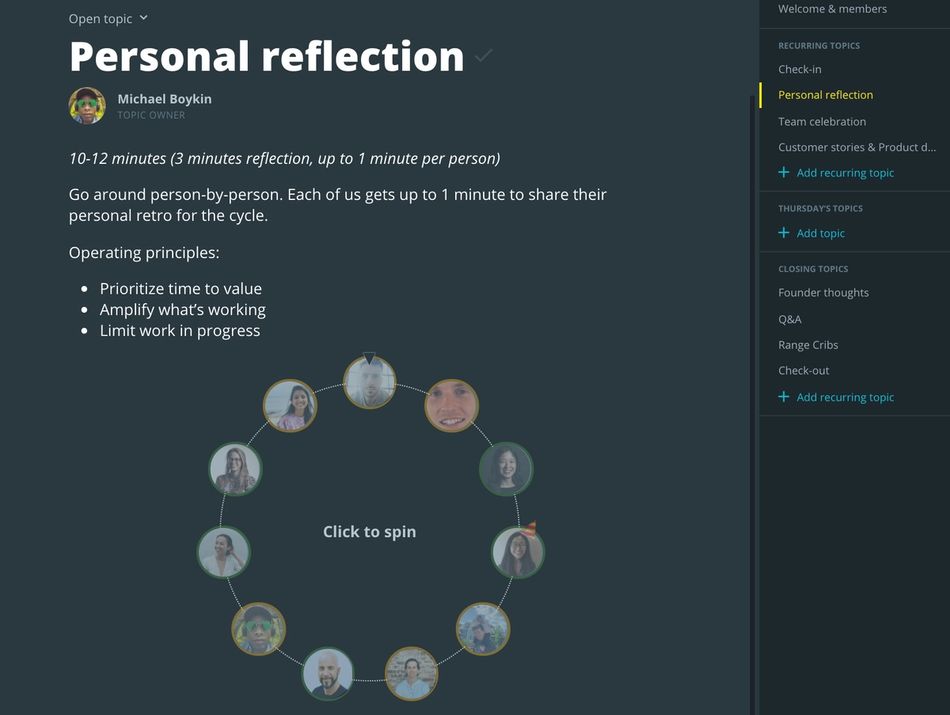
At the end of every two-week cycle, the entire team at Range reconvenes for 90 minutes for a Cycle Recap meeting. You might think, wow that sounds like a long meeting, and on a Friday? — which is what I thought as well before my first Recap. But with the structured meeting agenda, it’s engaging, it’s celebratory, it’s reflective, and believe it or not, it’s honestly one of my favorite recurring meetings.
We start off with a personal reflection period at the beginning of the meeting, where we have some time to quietly reflect and then go “around the room” with a meeting spinner to share our reflections. Each week, the reflection prompt changes, depending on which company principle we want to highlight. This past cycle, the principle was “Amplify what’s working,” so we each shared what was working and how we were going to amplify it.

After everyone was done sharing, we realized, wow that was a dense bundle of useful time management tips and productivity hacks! So I aggregated some responses here to share:
Getting Feedback Sooner
Looping in my team to give feedback has sparked new ideas and sped up the timeline to launch. Instead of waiting until the project was “polished” or complete, I have shared my progress with teammates earlier on, instead of waiting until I felt like it was perfect. In the end, it has created a better final result
— Sean H
Making Consistent Progress
Doing my “bounded” work first helps me get a concrete chunk of work done each day. It’s very easy to dive deep into a problem and spend time on it without making real progress. Get something smaller shipped first before jumping into problems of unknown scope.
— Joseph
Building Team and Project Momentum
When we all work towards the same goal (instead of each engineer working on completely separate projects), it creates a strong sense of momentum and progress.
And for projects that are going well, double down on what’s working by continuing to execute and also explore and experiment with how to amplify it even more.
— Jean
Inviting Collaboration
Creating surface areas for others to get involved leads to joint ownership and collaboration. For example, write "problem docs" that outline:
- The pain point you're solving
- What the solution looks like (usually just the inverse of the problem)
- The hypothesis of the initiative (how do you plan on implementing the solution?)
- All the "knowns" relating to the subject.
Share with teammates, encouraging them to comment, make suggestions, and brainstorm inline. Then I can move forward with confidence having gotten everyone on the same page.
— Ryan
Using Range Check-ins More Effectively
Adding more details and context to my “What Happened” section of my Check-in every day helps in the long term. When I do mini-retros at the end of projects, it’s useful to see specifics of what happened / how things progressed since it’s really hard to remember after the fact.
Being more detailed also motivates me to cut down the scope of my daily work, rather than thinking “I worked on this big task yesterday, but didn’t finish it yet. I’ll keep working on this big task” shifting towards “I’m working on this big task, yesterday I did this specific thing to move it forward. Today I’ll do this other specific thing as the next step.” I think this actually helps me break up my work and open smaller, faster PRs.
— Yoobin
Team Planning
Organizing work as team workstreams, rather than individual workstreams. Doing fewer things at once brings more focus, and creates visible results more quickly, which helps the team feel a sense of momentum. Planning can also be team-based, instead of an individual going away for a while and making the perfect plan to show everyone. Planning in smaller iterative steps and sharing with the group yields better results and means the team is already aligned around the plan. Also, as an added bonus, if someone is gone unexpectedly, the work can still move forward and other people are less likely to be completely blocked.
— Sean M.
Time Management
Batching my work reduces the time I spend context switching. When I’m working on many different types of tasks across different projects/problem areas, I try to batch my tasks, either by task type or project type. Plan out what work you need to get done over the course of the week and create blocks in your calendar to hold time to get it done.
— Bhavika
Delegation and Letting Go
As a founder you have so much more context than others, just by default. It's really easy to think you can help things go faster by getting involved. But this obviously doesn't scale and can end off disempowering the team. Instead, trust that they'll call you in when you are needed and otherwise take a stance of corrective action even over preventative action.
— Dan

Interested in adding a bit of structure to your team meetings, and making space for team reflections like these? Depending on the prompt, you can share productivity hacks, shift the team mood, create a deep sense of gratitude, celebrate recent wins, and more.
You can easily add your team prompts to Range’s meeting tool, which makes it easy to keep meetings efficient and useful, even as your team grows.
When selecting team prompts, consider what you want to achieve. Do you want to:
- Reinforce team values? “What’s one way you’ve <insert team value>?"
- Build a culture of gratitude? “What’s one thing you’ve been grateful for this week?”
- Share something personal? “What’s one thing you��’re looking forward to this weekend?”
- Learn something new about each other? Try our Icebreaker tool for a variety of fun questions.








